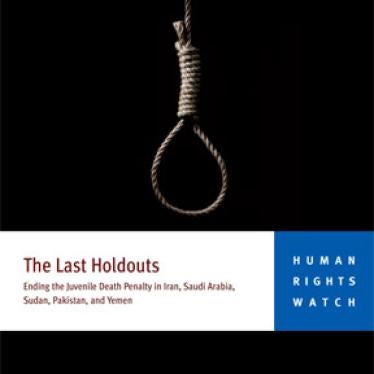(New York, October 28, 2008) – Latin American and Caribbean governments should drop their opposition to UN efforts to end executions of juvenile offenders, Human Rights Watch said today. UN diplomats in New York are debating the juvenile death penalty as part of negotiations on a General Assembly resolution on the rights of the child.
Last week the group of Latin American and Caribbean states rejected a proposal from the European Union to call for an immediate suspension of all juvenile executions, pending abolition through legal reform, even though none of the countries in the region has carried out such executions since at least 1990. The group also rejected a proposal for a report from the UN secretary-general on compliance with the absolute ban on the juvenile death penalty in international law.
“It’s simply baffling that Latin American and Caribbean states would block efforts to end the execution of children,” said Jo Becker, children’s rights advocate at Human Rights Watch. “None of these countries have executed juvenile offenders for years. Why would they possibly defend this practice?”
All countries in Latin America and the Caribbean are party to the Convention on the Rights of the Child, which prohibits any executions of persons for crimes committed before the age of 18.
Only five countries worldwide currently carry out executions for such crimes. However, the number of such executions has nearly tripled in the last four years. Since January 2005, Iran, Saudi Arabia, Sudan, Pakistan and Yemen have carried out 32 such executions, with well over 100 other juvenile offenders on their death rows. Between 2001 and 2004, 12 known executions of juvenile offenders took place worldwide.
“While only five countries still execute juvenile offenders, the recent rise in such executions is extremely worrying,” said Becker. “Latin American and Caribbean states should join others in calling for an immediate end to this barbaric practice.”
Since January 2005, Iran has been responsible for 26 of the 32 known executions of juvenile offenders worldwide. Saudi Arabia and Sudan have each executed two juvenile offenders, and Pakistan and Yemen have each executed one.
On October 14, the day the UN General Assembly began its annual debate on children’s rights, more than 300 nongovernmental organizations (NGOs) from 82 countries called on the General Assembly to take urgent action to end executions for crimes committed by children. Organizations signing the statement included groups from Argentina, Aruba, Bolivia, Brazil, Chile, Dominican Republic, Ecuador, El Salvador, Mexico and Peru.
Negotiations on the rights of the child resolution are continuing this week in New York. The resolution is expected to be adopted in November.







